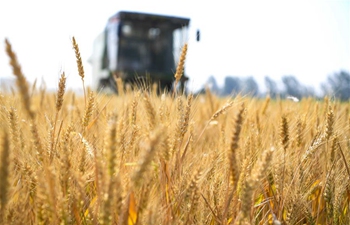WASHINGTON, June 3 (Xinhua) -- An international team of researchers believed that they've moved a step closer to invent a universal flu vaccine that could prevent a potential influenza pandemic.
The study published on Monday in the journal Nature Medicine showed that targeting a specific area of the flu virus could protect humans from the epidemic.
The specific area is the stem of hemagglutinin, a type of protein on the virus. The current flu vaccine targets the head of hemagglutinin, a part that changes most often, according to the study.
Researchers said targeting the stem of hemagglutinin, a less variable, more stable part, would allow vaccines to prevent a wider range of flu viruses, but it had not been tested in humans until now.
Investigators from the University of Michigan, the Icahn School of Medicine at Mount Sinai and other institutions looked at naturally occurring influenza cases in Nicaragua for years.
They followed 88 people with confirmed pandemic H1N1 influenza A virus infection and 300 of their household contacts. For the latter group, the team measured preexisting hemagglutinin stem antibody levels and obtained additional blood samples 30 to 45 days later.
Investigators also obtained nasal and throat swabs from contacts at the start of the study and every few days for approximately two weeks thereafter to track whether they became infected with influenza virus.
Eighty-four (28 percent) of the 300 household contacts eventually contracted lab-confirmed influenza virus infection, and 53 (63 percent) of those infected developed influenza symptoms, according to the study.
The investigators found that people with higher levels of hemagglutinin stem antibodies at the start of the study were less likely to become infected with influenza. A rise of four times in the amount of stem antibody levels correlated with 42 percent reduction in influenza infection, according to the study.
"That is great news as it supports the idea that stalk antibodies may be able to provide protection against influenza and could enable scientists to design a broader, more effective influenza vaccine," said Aubree Gordon, a professor of epidemiology at University of Michigan's School of Public Health, in a statement.
The investigator said the future studies should examine the role of stem antibodies for various strains of influenza virus.

















